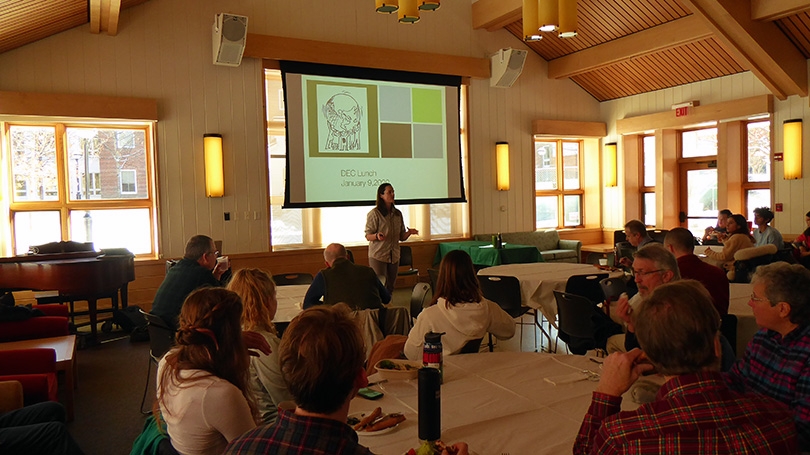
- About
- Education
- Research
- Thought Leadership
- Engagement
- News & Events
Back to Top Nav
Back to Top Nav
Back to Top Nav
Back to Top Nav
Back to Top Nav
Sitting in the sun-filled Goldstein Hall, we listened to Rosi Kerr, the director of the Sustainability Office, whose energy and expertise made the usual lunch meeting pass even more quickly. Thursday, January 9, 2020's DEC lunch was all about Dartmouth energy.
Kerr began her presentation by setting the scene. She stated that solutions needed context for them to work, and energy solutions at Dartmouth would be different from those in Arizona or Texas. We are a mountainous and remote region, but with the same energy needs of any other community. To provide reliable energy, Dartmouth has generated steam to heat campus since the late 1800s.
When it first built its power plant in 1898, Dartmouth used coal to heat buildings before switching to no. 6 fuel oil in 1922, and we have used the same fuel and operations ever since. As of 2018, Dartmouth's energy consumption includes 72% No. 6 fuel oil, 2% solar energy, and 26% grid electricity (which can also be a mix). Grid electricity, for example, can be generated using a mix of oil, natural gas, solar, wind, and nuclear energy.
With the current climate crisis and Dartmouth's setting and needs in mind, Kerr detailed energy goals the College has, the two most prominent being 100% renewable energy sourcing and an 80% greenhouse gas reduction (by a 2010 baseline) by 2050. Along with Dartmouth's energy commitments, Kerr also shared with us what she, personally, envisions for Dartmouth's energy system.
According to Kerr, a sustainable and secure energy system needs to be resilient, agile, and adaptive. These goals, for Kerr, should frame the ongoing conversations about the College moving to biomass from No. 6 oil to heat the water that will heat campus.
As part of its energy transition goals, the College had planned to build a biomass plant. However, after receiving input from students, alumni, and local residents about the negative environmental impacts of biomass, the College has reopened conversation about other ways to move away from No. 6 oil.
Instead of investing millions of dollars into a single source like biomass, Kerr envisions a diversified energy system that can use all types of energy to produce electricity or heat. Then, in the face of advancing technology and climate change, Dartmouth's energy system can adapt and shift to the most sustainable and cost-effective options.
Kerr's talk left me with more questions than answers, in terms of the future of Dartmouth's energy energy. When will the College commit to renovating all the buildings on campus to increase energy efficiency, especially in the face of the climate crisis? Will the College ultimately commit to the biomass plant, despite its drawbacks and protests? Will the College reach its energy goals, especially after its current challenges in finding a replacement for No. 6 oil? Though I now know more about what powers the lights I turn on every day, I still want to know more about our future.
Jennifer Chen '23 is an Irving Institute communications intern.